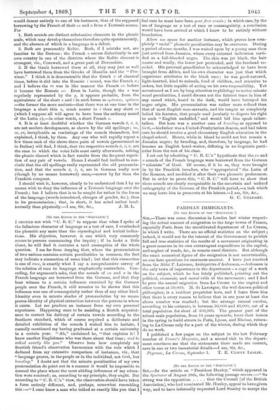ITO THE EDITOR OF THE " SPECTATOR."'
I SHOULD not wish "C. B. C." to suppose that when I spoke of the fallacious character of language as a test of race, I overlooked the phonetic any more than the etymological and lexical indica- tions. His objection, however, is one which very commonly occurs to persons commencing the inquiry ; if he looks a little closer, he will find it contains a tacit assumption of the whole question. I am far from denying that, where the pronunciation of two nations contains certain peculiarities in common, the fact may indicate a connection of some kind ; but that this connection is one of race, is exactly what I say a comprehensive survey of the relation of race to language emphatically contradicts. Con- ceding, for argument's sake, that the sounds of en and u in the French language are borrowed from the German, and that they bear witness to a certain influence exercised by the German people over the French, it still remains to be shown that this influence was one of consanguinity rather than of any other kind. Identity even in minute shades of pronunciation by no means proves identity of physical extraction between the persons in whom it exists. Let me produce an instance from my own personal experience. Happening once to be assisting a Scotch acquaint- ance to correct his delivery of certain vowels according to the Southern standard, which of course required a deliberate and detailed exhibition of the sounds I wished him to imitate, I casually mentioned my having graduated at a certain university in a certain year. " Ah," exclaimed he, "that explains it ! I knew another Englishman who was there about that time ; and he talked exactly like you." Observe here how completely my Scottish friend's observation harmonizes with the rule which I deduced from my extensive comparison of instances, viz., that "language proves, in the people or in the individual, not birth, but breeding." I doubt not that the minute peculiarities of my own pronunciation do point out in a manner it would be impossible to conceal the place where the most abiding influences of my educa- tion were received ; as, according to my principle, they ought. But according to "C. B. C.'s" view, the observation should have taken a form entirely different, and, perhaps, somewhat resembling this :—" I once knew a man who talked so exactly like you that I
feel sure he must have been your first cousin ; in which case, by the use of language as a test of race or consanguinity, a conclusion would have been arrived at which I know to be entirely without foundation.
Allow me space for another instance, which proves how com- pletely "racial" phonetic peculiarities may be overcome. During a period of some months, I was waited upon by a young man then just arrived from Jamaica, whom every external indication certi- fied as a full-blooded negro. The skin was jet black, the hair coarse and woolly, the lower jaw protruded, and the forehead re- ceded. His paternal grandfather he acknowledged to have been brought from Africa, and his own character was just that which experience attributes to the black race ; he was good-natured, light-hearted, kind to animals, fond of children, and attentive to orders, but little capable of acting on his own responsibility. Yet accustomed as I am by long attention to philology to notice minute vocal peculiarities, I could discern not the faintest trace in him of any sound which, heard in the dark, would have betrayed his negro origin. His pronunciation was rather more refined than that of most English men-servants, and his tongue so completely belied his features, that people used jocularly to dispute his right to such "English undefiled," and would bid him speak talkee- talkee. But here was a another case of breeding as opposed to birth,—hisfather was a United-Presbyterian deacon, and had taken care he should receive a good elementary English education in the chapel-school. Hence, while in blood he could not but remain a Jamaica negro ; by breeding, and, therefore, by language, he had become an English hotel-waiter, differing in no linguistic parti- cular from the rest of his class.
I set out by admitting" C. B. C.'s " hypothesis that the eu and u sounds of the French language were borrowed from the German " colonists " of Gaul. Of course, if it be so, they were brought in by the Frankish invaders, who " appropriated " the Latin of the Romans, and modified it after their own phonetic preferences. But in order to prove this, " C. B. C." will have to show that these sounds are clearly recognizable in the uncertain and unfixed orthography of the German of the Frankish period,—a task which we may leave him to prosecute at his leisure.—I am, Sir, &c.,
G. C. GELDART.






























 Previous page
Previous page